#i know we always venerate talent and put people on pedestals.... that's a tale as old as time
Text
I think on this fine Saturday afternoon it's a good opportunity to take a breather and remember that there are really no ethical paparazzi pictures. Every single one is inherently exploitative.
Just because photos were taken on a movie set, when someone is 'working,' does not make the practice any less invasive and creepy. Imagine just going about your day, doing your job and having some weirdo snapping pictures of you to sell without your consent for others to endlessly repost online.
There are thousands of pictures of your favourite actor online already. Plenty taken with his knowledge and consent. I'd really like to see more of them on my dash, rather than the creeper shots.
And don't get me started how disseminating these pictures directly leads to people going to said sets. What starts off as admiring how good someone looks has real world implications.
No, hanging around a movie set and disrupting people doing their jobs is not harmless fun or a way to show your appreciation.
If you hang around a movie set, you are a stalker.
Don't tell me that it's okay to take your online admiration for someone offline. You may admire him but he does not, and will never, personally know you. He will never be your friend/boyfriend/daddy. He is a stranger.
The only way meeting your favourite actor is going to happen is at a convention or maaaaaybe a movie premiere if you're incredibly fortunate. You know, places they appear specifically to meet fans (or not in the case of premieres, where the purpose is to promote a movie. Which is also completely understandable if actors don't stop. You are not owed an interaction).
Of course, you cannot help it if you randomly run into someone you admire in the wild. Even then, consider that they probably won't be all too thrilled to be approached in public by a complete stranger. It's up to you to gauge the situation, but remember there is a person at the heart of all of this.
Boundaries and respect are a kindness which deserves to be extended to each and every human being regardless of their looks/talent/fame/wealth.
Fandoms blur those lines a little too often for my liking and I think just scrutinising what you're interacting with, or what behaviour you could be possibly falling down that slippery slope towards is nice to do every once in a while.
I mean no malice with this post and it is not directed at anyone in particular. It's something I cannot help but feel strongly about because I've seen this destructive cycle time and again in fandoms over the years. It's not healthy and it makes us all a little bit more disconnected from our humanity for it...
#not naming names but....... screw it#pedro pascal#pedro pascal fandom#accepting you will never interact with or meet this man will set you free from misery and jealousy i promise#he's great! if you think he's great watch another movie! write about a character! edit some photos of him! make gifs!#there are many MANY ways to engage with his work which don't include reposting creepy invasive photos taken without his consent#it's bs that this is just 'part of the job' because WHY... why should it be any different than any other job??#i know we always venerate talent and put people on pedestals.... that's a tale as old as time#but seeing him blow up last year was wild to witness and some of the behaviour from newer fans is very disheartening to see#he's just a human who poops and farts and is a dick sometimes like the rest of us. let's not treat him like a god thanks#spud rants#a lot LOL#i've bottled this up for a bit because the way this developed in real time to people actually going to the set is. what#and don't 'if pedro was in your city' because NO??? i wouldn't STALK SOMEONE? there's 0 justification for it#i have far better things to do than stalk people#i may be an autistic flop but i'm not a CREEPY STALKER autistic flop thanks x#anyway like i said this is truly not @ anyone in particular and i don't think you are a terrible person if you interacted with the photos#but please just remember there is a person at the heart of all this#a very talented and attractive person yes... but a person all the same#i would truly hate to be famous it gives me so much anxiety just the thought of the constant scrutiny#good thing i never will be LOL#fandom wank#discourse
68 notes
·
View notes
Photo
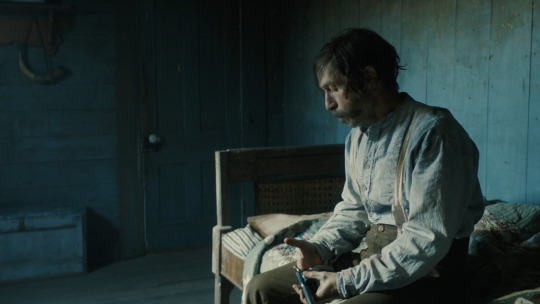
Work Horse.
Taking on a rare leading role in his decades-spanning career, national treasure Tim Blake Nelson speaks with Mitchell Beaupre about demystifying heroes, reinventing genres and something called a quiche Western.
“This film is unapologetic about all the tropes that it’s deploying in service of telling the story... You’ve got a satchel full of cash. You’ve got gunslinging, physical violence, and feeding somebody to the pigs.” —Tim Blake Nelson
Described by Letterboxd members as “a national treasure” who “makes everything better”, Tim Blake Nelson is a journeyman actor who has tapped into practically every side of the industry since making his feature debut in Nora Ephron’s This Is My Life back in 1992. Whether you are a Marvel fanatic, a history buff or a parent trying to get through the day, the actor’s distinctive presence is a charming sight that’s always welcome on the screen.
Tim Blake Nelson is one of those rare actors who unites all filmgoers, a man genuinely impossible not to love, which certainly seems to be the case for Hollywood. Checking off working relationships with directors ranging from Terrence Malick and Ang Lee to Hal Hartley and Guillermo Del Toro, Nelson has covered the boards, even crossing over into directing and writing, both in films and on the stage.
Yet, despite being a renowned talent who can take a smaller supporting role in a massive Steven Spielberg blockbuster starring Tom Cruise and carry the film, Nelson-as-leading-man sightings have been few and far between. In fact, it’s quite a struggle to find a film with Nelson in a leading role, as even playing the titular role for directors who understand his greatness still results in him only appearing in the opening section of an anthology feature.
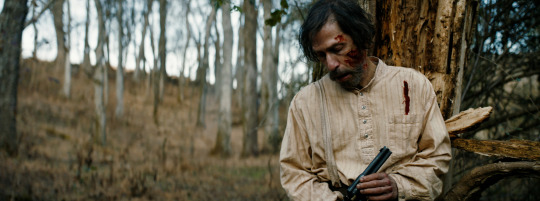
At last, the leading role Nelson fans were in need of has arrived in the form of Old Henry, a new Western from writer/director Potsy Ponciroli. Nelson plays the eponymous Henry, a widowed farmer with a mysterious past who makes a meager living with his son (Gavin Lewis), doing his best to leave his old life behind and hide away from the world. Things get complicated when Henry stumbles upon a satchel of cash and a wounded stranger (Scott Haze), bringing them both into his home. Soon, a dangerous posse led by an intimidating Stephen Dorff comes calling, setting the stage for an old-fashioned throwdown in this twisty Western siege thriller.
Premiering at the Venice Film Festival, Old Henry has been warmly received on Letterboxd. “Old Henry feels like the culmination of Tim Blake Nelson’s twenty-plus-year career, but from another dimension, where he’s highly regarded as a leading man”, writes Noah, speaking not only to the strength of Nelson’s performance, but also to the fact that this leading role shouldn’t be such a rarity. Todd awards Nelson the prize for “Best Facial Hair in a 2021 film”, before applauding the actor for pouring “every emotion in his body to play Henry”.
Letterboxd’s East Coast editor Mitchell Beaupre saddled up for a chat with Nelson about the intentional hokiness of the Westerns that made him fall in love with filmmaking, how the Coen brothers put other directors on notice, and the fatherly joy of keeping it all in the family.
I’ve seen a lot of interviews with you discussing your career as an actor, a writer, and a director. You always speak with such reverence for the art. Where does that passion come from for you? What made you want to pursue this field?
Tim Blake Nelson: It’s funny, doing these interviews for Old Henry has been reminding me of my introduction to filmmaking as an art. I’ve realized that I had never quite located it, but it really started with the Sergio Leone Westerns, which I would see on television when I was growing up in Oklahoma in the ’70s. Before that, going to the cinema was always invariably a treat, no matter what the film, but I would just be following the story and the dialogue.
The Sergio Leone movies were the first ones that exposed subjectivity in telling stories on film to me. That was where I became aware of the difference between a closeup and an extreme closeup, or how you could build tension through a combination of the angle on a character with the editorial rhythm, with the lens size, with the music in addition to the dialogue and the story.
How old were you when this shift in your understanding of cinema was happening?
I think it was across the ages of ten and eighteen, where I suddenly realized that this was an auteur here, Leone. There was a guy behind all these movies I was seeing—and in Oklahoma, you could see a Sergio Leone movie every weekend. This was a man making deliberate and intelligent decisions in everything that I was seeing.
I started noticing that a character was in a duster that goes all the way down to his boots, even though that’s not necessarily accurate to the Old West. That’s something else. Also, why is he wearing it in the desert? Would that have been very practical? And look at that cigar Clint Eastwood is smoking. It’s not smooth, it looks like it was a piece of tree root. Then later I learned it’s a particular kind of Italian cigar, but somehow it was defining this genre of Western. I marveled at that, and found it unbelievably thrilling to discover. I loved the stories and the dialogue and the intentional hokiness of it all. All of it was conspiring to teach me to venerate this form.
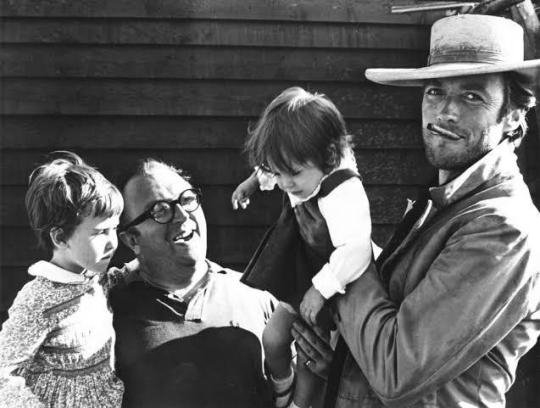
Sergio Leone, his daughters, and Clint Eastwood on the set of ‘The Good, the Bad and the Ugly’ (1966).
The connection there is interesting between the Leone Westerns to where Old Henry is at now. You’ve talked before about how the Western genre is one that is reinvented over and over throughout the years—
Oh, you do your homework!
I try my best! What would you say defines the current era of Westerns that we’re seeing, and how the genre is being reinvented?
Well, Joel and Ethan [Coen] did a lot of mischief, in a good way, with The Ballad of Buster Scruggs. Genres are always about genres, in addition to their story. So, I would say that Buster Scruggs is the quintessential postmodern Western, if you look at it as one movie instead of as an anthology, because it celebrates the history of the form. The magic of that movie is that it engages you in each story while also being a meditation on death. That’s what connects each one of those tales, and then it’s also a meditation on storytelling to boot. In the final chapter, you have a character talking about why we love stories, and he’s telling it to a bunch of people who you’ll learn are all dead.
The stories are a way of delaying the inevitable mortality.
I mean, look at that. It’s such an accomplishment. With that movie, I think Joel and Ethan put filmmakers on notice that Westerns had better always be also about Westerns, because whether you like it or not, they are. I think they probably came to understand that when they were making True Grit, although knowing the two of them they probably understood it already.
Do you feel there’s a direct correlation between a movie like Buster Scruggs and Old Henry, in this era of postmodern, revisionist Westerns?
How it impacts a movie like Old Henry is that you have Potsy embracing the Western-ness of the movie. This film is unapologetic about all the tropes that it’s deploying in service of telling the story. You’ve got the cantankerous old man hiding a past, who’s a maverick who wants to keep the law and the bad guys off his property. He wants to be left alone. You’ve got a satchel full of cash. You’ve got gunslinging, physical violence, and feeding somebody to the pigs. Yet, it’s all accomplished without irony in a very straightforward way that is utterly confident, and in love with the genre.
I think ultimately that’s why the movie works, because it’s very front-footed. It’s not hiding from you. It’s not deceiving you and trying to tell you it’s something that it isn’t. It’s a good, straightforward Western.
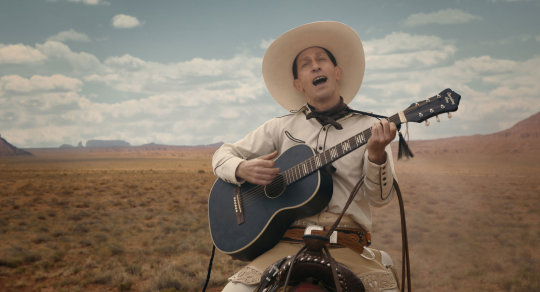
Tim Blake Nelson as the titular singer in ‘The Ballad of Buster Scruggs’ (2018).
That’s a bit different from those Leone Westerns, with all of their anachronisms.
I remember when the movie Silverado came out when I was growing up, and people were calling it a “quiche Western”, which was funny. That was what they would call it in Oklahoma because it had a bunch of movie stars in it, who weren’t known for being in Westerns. It was the Sergio Leone crowd calling it that. I went and saw it, wondering, “Well, if it’s a quiche Western, then why is everybody talking about it?” I saw it, and I loved it. Those folks putting it down like that were wrong. It’s actually a straightforward, hard-boiled, hardcore unapologetic Western. You don’t like some of the movie stars in it, but get over it. The reason that movie works is because it’s straight-ahead and well-told, and I think that movie holds up.
Old Henry is the same kind of animal. It’s more in the tradition of Sergio Leone—or, actually, I would say more in the tradition of Unforgiven. That was a big influence on Potsy.
Unforgiven was marvelous in the way it demystified that old black hat/white hat mentality of Westerns, opening up a more multi-dimensional understanding. You’re no stranger to that. A series like Watchmen takes that approach with superheroes, who in a sense hold the position now that Western heroes used to hold culturally. Do you find there’s more of a demand these days to challenge those archetypes who used to be put on pedestals—be they superheroes, cowboys, police—and provide a deeper analysis?
Absolutely, yes. At the same time, I think the demystified Western hero goes back to John Wayne in The Searchers. I think it really started with that character, one of the greatest characters ever in a Western. There’s One-Eyed Jacks, with Marlon Brando, which was made just after The Searchers, and again embracing this concept of an extremely complicated man. I don’t think you get the Sergio Leone movies without that.
I always think of McCabe & Mrs. Miller as a Western that was doing something totally different than anything I had seen before.
That’s another one, with that final image with the character smoking opium, going into oblivion after the demise of Warren Beatty’s very flawed character, after you’ve watched what it has taken to really build that town. You have a director, Robert Altman, making the deliberate choice to shoot in order so that they can build the town while they’re shooting the movie, and you really get the cost of it. I think there’s a lot of history to get to a place where a movie like Unforgiven can happen. Then Clint comes along and, as he often does, moves it forward even more.
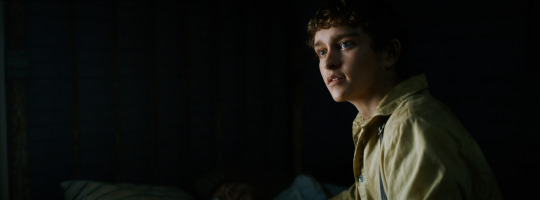
Gavin Lewis as Henry’s son Wyatt in ‘Old Henry’.
That’s a film that tackles legacy, as does Old Henry, which at its core is ultimately about the relationship between a father and his son. You got to work on this film with your own son, coincidentally named Henry, who was part of the art department. What is that experience like, getting to share your passion with your son on a project together?
Well, I think something that is true for the character of Henry and for myself, and perhaps all of us, is that we all want our kids to have better lives than ours. I want that to be true in every respect. Mostly, I want them to be more fulfilled than I have been. My kids look at me when I say that and say, “Thanks a lot Dad for raising that bar”, because they see that I have a pretty good life. Which I do, but I still think they can be more fulfilled than I am, and I want that for them. One of the great privileges of this movie was to watch my son—who was the on-set decorator—work his ass off.
Those are the words of an incredibly proud father.
He’s a work horse, and he’s learning about filmmaking, and I think on his current trajectory he will go beyond where I’ve gone as a filmmaker, directing more movies than I’ve been able to direct. Do a better job at it, too. He’s also a singer-songwriter, and I think he can have a venerable career doing that if he wants, but he wants to make movies too, and I hope that’s going to happen for him. It was a thrill to watch him do the work, the twelve- and fourteen-hour days, and after every take resetting and making sure everything was right. It felt like an accomplishment to see him take on that responsibility and do the real work every day.
Related content
SJ Holiday’s lists of Essential Neo-Westerns and Essential Modern Westerns
The Best Neo-Westerns of the 21st Century, according to JS Lewis
Our interview with Slow West director John Maclean
Follow Mitchell on Letterboxd
‘Old Henry’ is in US theaters now and on VOD from Friday, October 8.
#tim blake nelson#old henry#western#westerns#western movies#sergio leone#clint eastwood#stephen dorff#letterboxd#mitchell beaupre#coen brothers#coen bros#buster scruggs#joel coen#ethan coen
19 notes
·
View notes